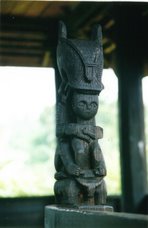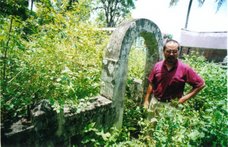Down to Earth No. 65, May 2005
Legal challenge to mining in protected forests
In an attempt to save forests and livelihoods, environmentalists have sought a judicial review of the government's 2004 decision to permit mining in protected areas.
The NGOs and individuals challenging the government on its pro-industry mining policy are focussing on the negative environmental, social and economic impacts. The July 2004 law allowing open-pit mining in lands classified by the government as 'protection forests' prioritises international mining investors over local communities' health, natural resources and livelihoods. Thirteen companies have been permitted to resume mining operations in protected areas.
The 92 petitioners have called on the expertise of two academics and a former minister to back up their arguments. On the first day of the case, April 5th 2005, Indonesia's Constitutional Court heard from former plantations and forestry minister, Muslimin Nasution. He explained how the government had enacted the 1999 forestry law, which bans open-pit mining in protected forests, after it became aware of the devastating effects. According to Muslimin, this law had been thoroughly discussed with the mining and environment ministries. The mining ministry, prompted by the concerns of mining investors, later pushed for the law to be revised.
Haryadi Kartodihardjo from the Bogor Institute of Agriculture, another expert witness, agreed that forests and the various services they provide are irreplaceable once destroyed. He also argued that mining such areas did not, as argued by the government, bring financial and development support for local governments. One of the 13 approved companies, PT Karimun Granit, he said, had brought losses of Rp4.3billion (US$452,631) per year (see also below).
Another academic, Eko Teguh Paripurno warned of impacts in terms of disasters such as floods, landslides, drought and dam sedimentation. He said forest destruction caused by mining also caused social disasters, due to the loss of assets which should belong to local communities.
Haryadi also pointed to the indirect impacts of mining in protected forests, which put yet more pressure on Indonesia's rapidly declining forests. Deforestation rates in Indonesia are the world's highest, estimated at 3.8 million hectares per year. These indirect impacts include better access to forests for illegal loggers, thanks to roads built for mining vehicles.
'Unprotecting' the forests
The judicial review is the latest in a long battle by civil society groups to stop mining in protected forests. A major blow to the campaign came in July last year when Indonesia's national parliament passed Law No 19/2004. This confirmed that mining companies whose contracts were signed before the 1999 forestry law could resume operations in protected forest areas. Forestry Law 41/1999, while criticised on many accounts, did at least attempt to limit destruction to certain forests by prohibiting open-pit mining in such areas. This had the effect of outlawing the activities of around 150 mining companies operating across the Indonesian archipelago. It affected the concessions of companies at the exploration stage, as well as some operations which had already started commercial mining, such as US/British-owned Freeport/Rio Tinto in West Papua, Canada's Inco in Sulawesi and Australian-owned Newcrest on Halmahera Island, Maluku.
The 1999 ban caused uproar in the international mining fraternity, which promptly started pressuring Jakarta to make legal changes in its favour. After a prolonged period of deliberations and despite widespread support for a strong national campaign to prevent mining in protected areas, President Megawati gave way to business and foreign government pressure. She issued emergency legislation in March 2004 (Perpu 1/2004) and, later, a decree permitting 13 of the affected companies to resume operations. It was this emergency legislation that was then confirmed by the national parliament last July (see DTE 61 for more background).
NGOs are demanding that the law be revoked, because both it and the Perpu were illegal. There have also been allegations of bribery in parliament where the amendment to the Forestry Act was passed by a narrow margin (just 29 votes, according to media reports). Afterwards, a group of parliamentarians revealed that they had been offered payments of Rp50 million to Rp150 million (US$5,000 - 15,000) to endorse the pro-mining legislation. Two parliamentary factions were reported to have unexpectedly changed their position from anti to pro-mining on the morning of the vote.
What impact?
The thirteen companies permitted to resume activities in protected forests are: Freeport Indonesia; Karimun Granit; Inco; Indominco Mandiri; Aneka Tambang (Buli-Mahit); Natarang Mining; Nusa Halmahera Minerals; Pelsart Tambang Kencana; Interex Sacra Raya; Weda Bay Nickel; Gag Nikel; Sorikmas Mining and Aneka Tambang (Bh Bulu Sultra).
Recent reports indicate that some of these projects are taking an unacceptable toll on local communities, the environment and local economies. They include:
PT Karimun Granit, which operates in the Gunung Karimun protected forest, Riau Islands province, Sumatra. Kartodihardjo, the witness in the judicial review, said continuing to mine the protected forest would bring annual environmental losses of around Rp8.5 billion (US$900,000), based on a calculation of impacts including water pollution and increased illegal logging. The local government received an income of Rp4.14 billion to Rp5.58 billion from the company in 2001-2003, meaning the overall deficit would be between Rp2.9 bn and Rp4.4 bn ($300,000 - 460,000). According to the mining advocacy network, JATAM, PT Karimun Granit has been mining granite on Karimun island for around 32 years, and has an extended contract which runs until 2013. The protected forest contains high levels of biodiversity and protects water courses. In 2002, a study by the Bandung Institute of Technology calculated that mining the protected forest would result in a loss of 74,790 cubic metres of water per year, not including water used by the mining operation itself.
Sorikmas Mining, which holds a concession covering 66,200 hectares in the Mandailing Natal district of North Sumatra. The concession is in the 108,000ha Batang Gadis National Park, established in April last year in an area formerly classified as protection and production forests. The company is 75% owned by Australian company Oropa Ltd, who took over Aberfoyle Pungkut Investments Pte Ltd from Pacmin and Western Metals Copper Ltd. Aberfoyle's Indonesian partner in Sorikmas is the government-owned PT Aneka Tambang. The local government and people of Mandailing Natal reject mining in the park, which guarantees supplies of drinking and irrigation water for rice-fields and plantation crops owned by the communities. The park is also home to endangered species such as the Sumatran tiger. According to former district government head Amru Daulay, illegal logging has become more prevalent in the park due to Sorikmas's mining activities. Gold exploration by the company has also scarred the area, leaving 400 large pits close to villages, according to Amru. He questioned why the central government allowed PT Sorikmas to operate in the park when the company had no licence from the forestry ministry.
PT Weda Bay Nickel, which is planning to open a nickel mining operation in the Aketajawe Nature Reserve and Lalobata protected forest on Halmahera island, North Maluku. The two areas were declared a national park in November last year and cover a total of 167,300 hectares of hill and lowland rainforest. According to the conservation organisation, Birdlife International, the new park is of exceptional biodiversity importance and is essential for at least 23 bird species found only in North Maluku. Weda Bay's CEO John Lynch boasted that the Canadian company played "a leading role" in the "cooperation" between the Indonesian government and mining industry, which led to the decision to allow mining in such areas. The future impacts of mining on the indigenous Tobelo Dalam community and the new national park have not been highlighted by the company. According to Birdlife, the Tobelo Dalam's livelihoods are already under threat from logging and forest clearance for settlements and plantations.
PT Nusa Halmahera Minerals, operated by Australian gold mining company, Newcrest on Halmahera Island, North Maluku. Local people's protests against the mine ended in violence in January 2004 when Brimob special forces police shot dead one protester and beat up several others (see DTE 60). In July last year, shortly after the green light was given to mining in protected forests, a mass protest in North Halmahera district was coordinated by village leaders, students and NGOs to reject Megawati's pro-mining decree and to demand that Newcrest leave North Maluku. Communities say the company must rehabilitate and restore the environment and the local economy which has been suffering since mining operations began. They also demanded an end to intimidation and violence by security forces and unfair treatment at the hands of the government, plus the fulfilment of all promises, including compensation and community development funds. The mass protest followed an earlier action in May, involving hundreds of local people and their supporters, who reoccupied the Toguraci protected forest, reclaiming their customary lands from Newcrest.
(Source: Jakarta Post 21/Apr/05, 14/Apr/05; ; www.oropa.com.au/current.html; www.madina.go.id/CONTENT/TNBG/TNBG.html; JATAM Press Release 2/Mar/04; Republika 19/Apr/05; ENS 12/Nov/04; Miningindo.com 28/Ju/04; Mineweb.com 17/Jul/04, Kerebok, April 2004.)
Indonesia's legal action against Newmont
Indonesia's environment ministry announced in March that it was taking legal action, demanding millions of dollars in compensation, against US-based mining multinational Newmont. The company is accused of polluting coastal waters near its Ratatotok goldmine in North Sulawesi.
In November last year, a government-sponsored study linked the company's mining operations to ill-health in the local community and declining fish stocks in Buyat Bay. Villagers have complained of skin disease, lumps, breathing difficulties and dizziness, which may be symptoms of arsenic poisoning, the study found. A five-month old baby died in July adding to a toll of more than thirty people whose deaths have been linked to pollution from the mine. Newmont Minahasa Raya dumps mine waste in Buyat Bay, but claims that there is no link to declining fisheries or health problems (see DTE 63 for background).
Five company executives, three Indonesians, one American and one Australian, are also facing criminal charges related to pollution, and could face up to 15 years in jail. Indonesia is coming under pressure from Australia, which has warned that the legal action could undermine foreign investment.
Meanwhile, a former Indonesian environment minister has joined NGOs in calling for a ban on Submarine Tailings Disposal - the waste method used by Newmont both in North Sulawesi and at its much bigger copper and gold mine on Sumbawa Island, in Nusa Tenggara Barat province. Sonny Keraf said it was much easier to control on-land tailings disposal, "because we can directly see the effect", whereas tailings could be spread underwater by strong currents, polluting the water.
(For more background on STD see DTE 50, also DTE/Minewatch Asia-Pacific report on STD, and www.jatam.org).
(Source: AP 27/Mar/05; Jakarta Post received 20/Dec/04)
http://dte.gn.apc.org/65MIN.HTM
Subscribe to:
Post Comments (Atom)


1 comment:
Domain Gratis co.cc fans club artis SEO Tutorial
Post a Comment